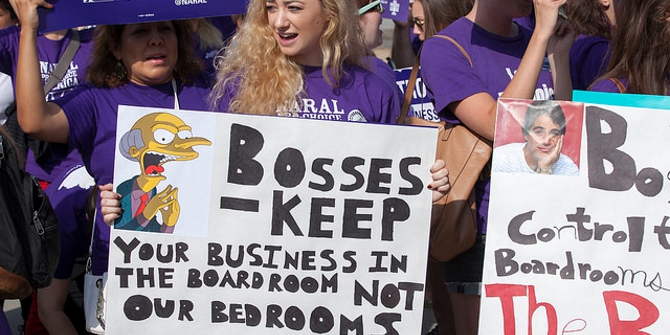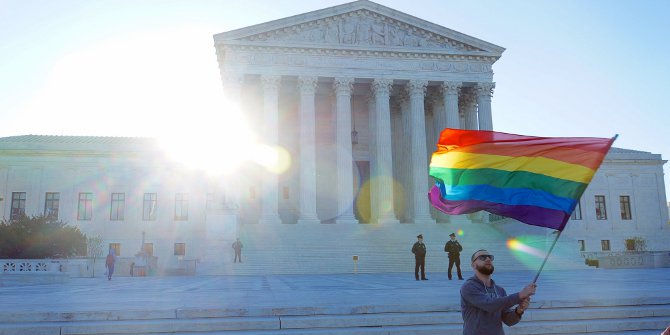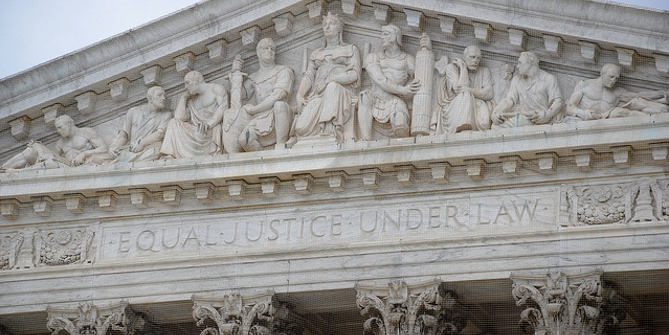 This week saw a sharply divided decision from the United States Supreme Court in Burwell v. Hobby Lobby Stores, Inc. In deciding that corporations are allowed to object to providing health insurance for employees that includes contraceptive coverage on religious grounds under the Religious Freedom Restoration Act (RFRA), the Court’s majority has sided with corporations and religious conservatives and against the federal government’s Obamacare and gender equality. Ruthann Robson argues the Congress has a number of options for changing the RFRA in the aftermath of the decision: it could amend the RFRA to define “person” as not including for profit corporations; change the level of scrutiny of the Act; or it could simply repeal it.
This week saw a sharply divided decision from the United States Supreme Court in Burwell v. Hobby Lobby Stores, Inc. In deciding that corporations are allowed to object to providing health insurance for employees that includes contraceptive coverage on religious grounds under the Religious Freedom Restoration Act (RFRA), the Court’s majority has sided with corporations and religious conservatives and against the federal government’s Obamacare and gender equality. Ruthann Robson argues the Congress has a number of options for changing the RFRA in the aftermath of the decision: it could amend the RFRA to define “person” as not including for profit corporations; change the level of scrutiny of the Act; or it could simply repeal it.
What can Congress do after Hobby Lobby? In a word: lots!
The United States Supreme Court delivered its widely anticipated and sharply divided opinion in “Hobby Lobby” – – now Burwell v. Hobby Lobby, Inc. consolidated with Conestoga Woods Specialties Corp. v. Burwell – on Monday, the last day of the Court’s Term in 2013-2014. The majority, in an opinion authored by Justice Samuel Alito, held that closely held corporations (or their owner/shareholders) are able to interpose a religious objection under RFRA (the Religious Freedom Restoration Act) to a federal requirement that employers provide health insurance to employees that includes contraceptive coverage. Justice Ruth Bader Ginsburg authored a blistering dissent. The 5-4 decision is clearly divisive. Just as clearly, however, it is not a constitutional one. Although the First Amendment hovers in the background and is the basis of many of the cases the Court relies upon, the decision in Hobby Lobby is one of statutory interpretation of a federal statute.
Importantly, the decision is an interpretation of the word “person” in the RFRA statute, passed by Congress in 1993. Equally important, the decision is an application of the requirement under RFRA that a person’s religion be “substantially burdened.” And perhaps most important, the decision is an application of the ultra-strict scrutiny that the RFRA statute imposes: the government interest must be compelling and that interest must be effectuated by the “least restrictive” means.
According to the Court’s majority, closely-held for-profit corporations are persons. Moreover, the Court rejected arguments that an employer’s participation in a health insurance plan allowing employees in consultation with their health providers to make medical decisions and be reimbursed was too attenuated to be a burden on the employer’s religious beliefs, never mind a substantial burden. Finally, while the Court majority assumed the government interest was compelling, it concluded that the regulations’ mandate of employer compliance or fines was not the least restrictive means because the federal government had available other means to accommodate the employers’ religious interests: the same accommodation the government had provided for certain nonprofit religious organizations. Indeed, the federal government’s provision of exemptions for non-profit religious groups – for example the child care center run by a church -was the wedge used to pry open the door of an exemption for Hobby Lobby, a large (even if closely held) corporation running a chain of 500 stores with more than 13,000 employees.
So what can – should – Congress do?
First, and most narrowly and easily, Congress could amend RFRA to specifically define “person” as not including for profit corporations. At present, RFRA contains no explicit definition of “person” and so the definition defaults to the Dictionary Act, 1 USC §1, which defines person as including “corporations, companies, associations, firms, partnerships, societies, and joint stock companies, as well as individuals,” unless, as the Act states, “the context indicates otherwise.” Congress could simply amend RFRA to clarify that in the “context” of religion, the rule should be “otherwise,” and for profit corporations cannot assert a religion that would be “substantially burdened,” no matter how “closely held” they are.

Second, and perhaps most appropriately, Congress could – and should – change the level of scrutiny from an ultra-strict to a simply rational basis. This would make the Religious Freedom Restoration Act consistent with current First Amendment doctrine. RFRA was meant to “reverse” or “overrule” a specific Supreme Court decision, Dept. of Human Resources of Ore. v. Smith (1990), which had ruled that unemployment benefits could be denied to those violating a state drug prohibition, even though that drug had been used for religious reasons. This alteration now only applies to the federal government, the Court having previously declared RFRA unconstitutional as applied to state governments because RFRA exceeded Congressional power under §5 of the Fourteenth Amendment, City of Boerne v. Flores (1997). Not only is Congress holding itself and the rest of the federal government to a higher standard than state governments, it is an untenable standard. It is close to impossible for a government to meet a requirement when it has chosen the least – indeed, the very least – restrictive means to accomplish its purpose.
Third, Congress could simply repeal RFRA. The statute has outlived its usefulness and has had unintended consequences, as the decision in Hobby Lobby demonstrates. Congress exceeded its powers as to states and made a mistake as to all levels of government.
The arguments underlying all three possible Congressional actions to amend or repeal RFRA include religious liberty as well as gender and worker equality. The majority’s decision in Hobby Lobby creates a serious disincentive for Congress or federal agencies to grant exemptions or accommodations for religious organizations. These organizations are generally ones in which the employees and the employers share a community of interests and beliefs. Or, at the very least, these organizational employers are ones which employees have notice of the religious enterprise. Applying for a job as a childcare worker at a nonprofit church-run nursery and applying for a job as a cashier at a retail chain of craft stores is a distinction that has a lived difference. It should also have a legal difference. Without that legal difference, government entities that might grant an exemption to a religious organization might well and wisely refuse to carve out an exemption for these nonprofits because such an exemption would apply to multi-million dollar corporations with thousands of employees.
While Congress should take care when seeking to “reverse” Supreme Court opinion, Congress did not take such care when it sought to “overrule” Smith by enacting RFRA. Now Congress should act quickly and firmly to remedy the problem it caused by enacting RFRA. What Congress giveth, it can taketh away. And it should.
Please read our comments policy before commenting.
Note: This article gives the views of the author, and not the position of USApp– American Politics and Policy, nor of the London School of Economics.
Shortened URL for this post: http://bit.ly/1mJ8Ppu
_________________________________
 Ruthann Robson – City University of New York (CUNY)
Ruthann Robson – City University of New York (CUNY)
Ruthann Robson is Professor of Law and University Distinguished Professor at City University of New York (CUNY) School of Law and Honorary Visiting Professor at City University London School of Law, co-editor of The Constitutional Law Professors Blog, and the author most recently of Dressing Constitutionally: Hierarchy, Sexuality, and Democracy – From Our Hairstyles to Our Shoes (Cambridge University Press 2013).







One would have to show RFRA is unworkable in its current form. However, as was noted during oral arguments, RFRA challenges have often failed over the last 20 years, suggesting this case is an exception and not the rule.